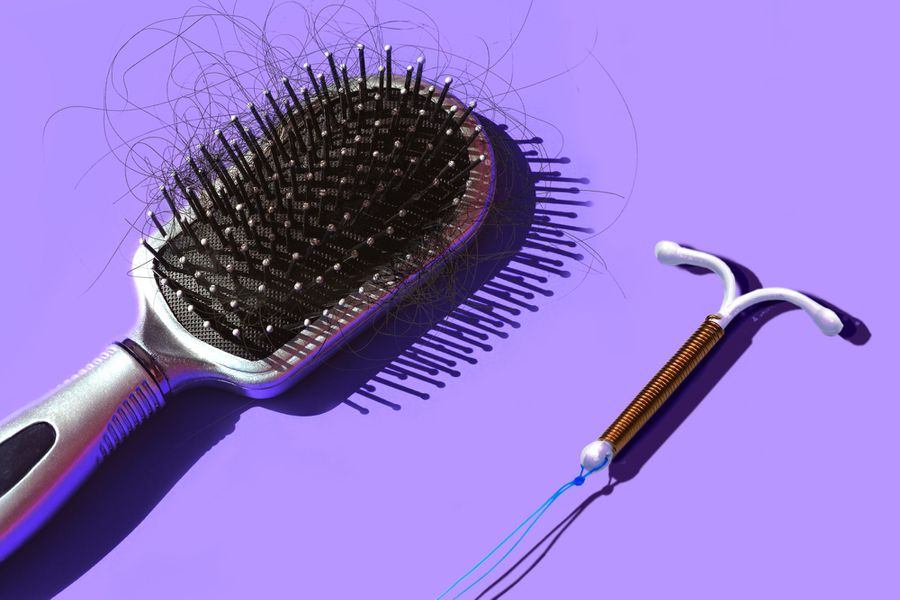
When you’re ready to switch up your current method of contraception, you’ve probably been told to expect an uncomfy, unwanted side effect or two after making the change. You may have heard from your roommate that copper IUDs can trigger some painful menstrual cramps or that the pill can leave you with nausea and headaches for the first few menstrual cycles. But does your birth control also have the potential to cause hair loss?
Birth Controls That May Cause Hair Loss
In general, research shows that contraceptives containing the progestins norethindrone, norgestrel, or levonorgestrel have the strongest androgenic effects and have the biggest potential to trigger hair loss. However, studies investigating the commonality of this side effect are limited.
In one study of more than 17,000 women in Finland who had an IUD containing the progestin levonorgestrel (which has high androgenic effects and is also found in some progestin-only and combined oral contraceptives), nearly 16 percent reported hair loss while using the medication, though the exact cause of this hair loss wasn’t investigated, so the link can’t be verified. Similarly, a review of case studies found that women who experienced hair loss after insertion of a levonorgestrel IUD also reported having no risk factors for alopecia, and some users’ hair loss recovered when the IUD was removed, suggesting a relationship between birth control and hair loss. To be clear, the concern is not just with IUDs: A 2001 study on the side effects of Norplant, a contraceptive arm implant containing levonorgestrel, showed “statistically significant” increased rates of alopecia in implant users compared with those who had an IUD or sterilization (closing off the fallopian tubes).
With oral contraceptives, the hair-loss risk may depend on the type of pill and the ingredients included in it, according to the JAAPA research. Progestin-only pills (and other progestin-only contraceptives) may come with a greater risk of androgenic alopecia because they lack estrogen, which research shows may counteract the androgenic effects of the progestin by increasing levels of sex hormone-binding globulin (SHBG) — a protein made by the liver that binds to and inhibits follicle-shrinking DHT. This increase of SHBG seems to be greatest with combined contraceptive pills containing 30 micrograms of ethinyl estradiol (for reference, most combination pills contain 10 to 35 micrograms of this synthetic estrogen, according to the Mayo Clinic) and progestins that already have a smaller androgenic effect (e.g. desogestrel, norgestimate, norelgestromin, and etonogestrel), according to the JAAPA research. (Wait, can birth control make you tired?)
What to Do If You Think Your Birth Control Is Causing Hair Loss
Before you start panicking about all the loose strands in your brush, know that it’s normal to lose 50 to 150 hairs daily, whether or not you use birth control, says Dr. Yen. If you think you’re losing more than that, consider talking to your doctor.
If you’re noticing significant shedding, reach out to your primary physician, who can help pinpoint any underlying conditions that may be contributing to your hair loss, adds Dj Singh, M.D., M.M.M., F.A.C.O.G., an ob-gyn in Torrance, California. “Stress, genetics, trauma, childbirth, excessive dieting, any viral illnesses — including, in current pandemic times, COVID — can contribute to hair loss,” she explains. “Sometimes it does take a team of specialists along with your primary physician, such as endocrinologists, ob-gyns, dermatologists, and/or rheumatologists, depending on the underlying medical condition, [to find the right] treatment.”
If your health-care provider believes your new birth control is causing hair loss, Dr. Yen suggests first sticking with your contraceptive method for about three to six months so your body can get used to the new hormones — as long as you get the approval to stay the course from your own doctor. “If it’s not better by then, then your body doesn’t like it and you should consider switching [methods],” she adds. Refresher: There are eight different types of progestins, and changing your contraceptive to one with a smaller androgenic effect may ease the shedding, according to the JAAPA article. Similarly, trying a combined birth control pill with at least 30 micrograms of ethinyl estradiol could reduce hair loss, according to the JAAPA research.
Of course, hormonal birth control isn’t your only option. Hormone-free options such as condoms, the copper IUD, or Phexxi (a vaginal gel that maintains vaginal pH after sex to reduce sperm motility) can all reduce your risk of pregnancy without increasing your potential risk of hair loss. If you’re still dealing with hair loss about six months after switching to non-hormonal birth control or one with a smaller androgenic effect, talk with your dermatologist to determine the best way to treat your shedding, according to the JAAPA article.
The Takeaway On Birth Control and Hair Loss
While certain contraceptives do contain androgenic progestins that may induce hair loss, there isn’t enough high-quality data to establish a causal relationship between the two, according to a recent review published in the journal Dermatology. Still, if you’re worried a birth control you’re considering taking is going to make you lose all your locks — or you think your current contraceptive is driving some major shedding — talk with your doctor about your concerns. Remember, you’ve got options.






































